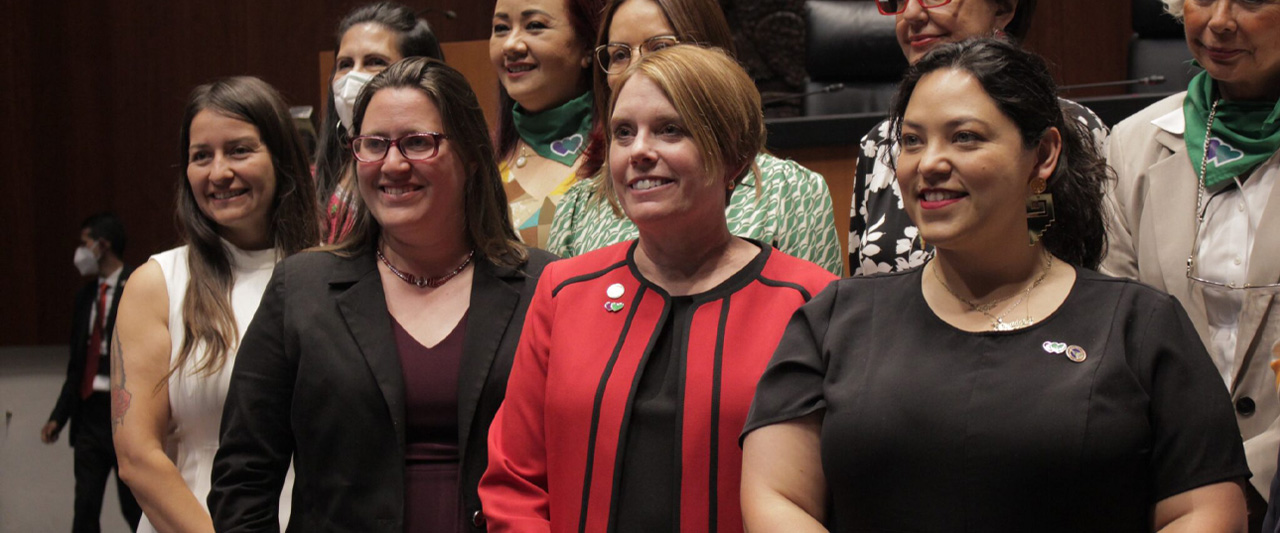A U.S. state legislator working to protect abortion access is finding inspiration in Mexico’s abortion rights movement. Here’s our Q & A with Rep. Julie von Haefen of North Carolina:
Photo above from left: New Mexico state Rep. Micaela Lara Cadena, New Mexico state Sen. Linda Lopez, Texas state Rep. Erin Zweiner, Mexico Sen. Cora Cecilia Pinedo Alonso, Mexico Sen. Nuvia Magdalena Mayorga Delgado, North Carolina state Rep. Julie von Haefen, Mexico Sen. Patricia Mercado, Colorado state Sen. Julie Gonzales and Mexican Senate President Olga Sánchez Cordero pose for a photo in Mexico City in May 2022. (Sari Soffer/Courtesy of State Innovation Exchange)

Did you ever dream that state legislators from the United States, where Roe v. Wade has guaranteed legal abortion for nearly 50 years, would look to Mexico to learn how to expand and protect abortion rights?
For a long time, Mexico looked to the United States as the “gold standard” for protections around abortion, but we’ve seen that changing over the last few decades. The “green wave” movement through Latin and Central America has changed hearts and minds about abortion in Mexico, and now we need to look to them to see what we can learn and how we can take what feminists and abortion advocates have done and apply it here in light of our current situation.
You recently traveled to Mexico with a group of several U.S. state legislators as part of a cross-country learning and knowledge exchange sponsored by the nonprofit organization State Innovation Exchange. What were the most important things you learned?
I learned that the fight for abortion rights is a fight without borders. The issues and restrictions that pregnant people face are the same whether you are in Mexico or the United States, and we should work together to be sure that all people can get the care they need. I also learned a lot about how activists in Mexico tackled the stigmas around abortion, such as their consistent messaging that abortion care is health care. They have been able to make abortion legal in many states of Mexico, which is conservative—politically and religiously—and this was very inspirational.
You met with abortion rights advocates and activists, health providers, elected leaders and local women who shared their abortion stories. What were some of the things that stood out most? Any surprises or insights?
One of my favorite parts of the trip, and probably the most emotional day, was the day we were in Monterrey and met with many abortion activists who run “accompaniment networks” which support pregnant people during the experience of considering, seeking and engaging in abortion self-care. Many of them were ordinary women who saw the need to give care, love and support to other women like themselves who chose to interrupt their pregnancy. The ingenuity and bravery that these women displayed, in light of possible danger or risk to themselves, was so amazing. It brought me to tears hearing about their stories. I also really enjoyed meeting with the other female lawmakers in Mexico City and Guadalajara who are doing the same type of work that we are in the United States and learning about how they have been successful in their roles.
In the United States, more than half of all abortion procedures are now carried out with pills. If Roe v. Wade is overturned, will the ability to access abortion pills be more important than ever?
Absolutely. In a post-Roe world, self-managing medication abortion may be the only option for people seeking abortion care. We must push for the decriminalization of self-managed abortion and remember that self-managed abortion options are safe, effective and available.
Tell us about the legislation you and several of your colleagues have introduced to protect and expand abortion access in North Carolina, and why its passage is crucial.
Last year, we filed the RBG Act (Remove Barriers to Gain Access to Abortion Act) which would have removed many of the barriers to care that have been put in place the last decade, including a mandatory waiting period, and restrictions on insurance coverage and providers. This year, we filed the Reproductive Freedom Act, which included the elements of the RBG Act as well as a provision to codify the protections of Roe v. Wade. By passing laws like these, we are codifying the right to make decisions about whether or not to have a child. We are telling the people and families of North Carolina that they matter and that we respect the freedom to make decisions about their own bodies. We have to show that we are fighting for these rights, and we will continue to do so, even in light of the hostile environment that we find ourselves in.
Anything else you would like to share?
Thank you to María Antonieta Alcalde, director of Ipas Central America and Mexico, who was with us on the trip and arranged many of the meetings that we attended. The trip changed my perspective on the fight for reproductive rights and gave me so much hope, and for that I am forever grateful.


